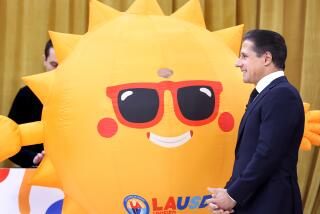Panel Holds Itself in High Esteem : Growth: Lampooned and lauded, task force on self-worth is going out of business. Its backers have nothing but praise for its work.
SACRAMENTO — California’s lampooned and lauded self-esteem task force goes out of business Sunday, but its backers feel really good about its accomplishments.
Its creator, state Assemblyman John Vasconcellos, says the task force “brought self-esteem from an object of ridicule to a subject of respect--throughout our state, across our nation and even now around our entire world.
“Self-esteem, formerly only cautiously addressed in the privacy of therapeutic encounters and personal growth weekends, has now become legitimate and mainstream, in conversation and in practice,” said Vasconcellos, a Democrat from Santa Clara.
Virginia and Maryland created their own task forces last year and several other states are considering similar actions. Forty-nine of California’s 58 counties now have their own self-esteem task forces.
Vasconcellos will present the task force work to the annual convention of the National Conference of State Legislators in Nashville, Tenn., in August. The same month, the First International Conference on Self Esteem is scheduled in Oslo, Norway.
The California task force’s 144-page report, “Toward a State of Esteem,” has sold more than 20,000 copies at $4 each since coming out in January. The report defines self-esteem as “appreciating my own worth and importance and having the character to be accountable for myself and to act responsibly toward others.”
While the law creating California’s task force expires on Sunday, Vasconcellos has plenty of plans for the future.
“It’s a conclusion of a phase, like a commencement,” he said.
A bill moving through the Legislature would create a state ombudsperson for self-esteem to monitor state agencies and see if they are following the task force recommendations. Another bill would provide $100,000 to the nonprofit National Council for Self Esteem so it can replace the task force as a clearinghouse for self-esteem information.
Vasconcellos became interested in the subject nearly a decade ago, partly because of his “own painful personal struggle--despite repeated successes and achievements in my life--to develop my own self-esteem.”
As chairman of the Assembly’s budget-writing Ways and Means Committee, he also saw the state pour billions into “too-little, too-late efforts to confine and-or repair our fellow Californians.”
He proposed a self-esteem commission in 1984. It took until 1986, and one veto, to get lawmakers and Gov. George Deukmejian to agree. The California Task Force to Promote Self-Esteem and Personal and Social Responsibility was given a three-year life, at $245,000 a year.
Shortly before its first meeting in April, 1987, cartoonist Garry Trudeau spent three weeks lampooning the task force. In his “Doonesbury” comic strip, the airhead character Boopsie, an actress and out-of-body traveler, was named to the task force. Trudeau pulled out all the California jokes about new-age music, hot tubs and reincarnation.
The nation laughed, but the task force members were not angry.
“The ‘Doonesbury’ thing was a curious thing that made us famous, that gave us a national audience immediately that we could not have bought,” Vasconcellos said.
The task force went to work, with few further sniggers and a growing respect. It produced a report listing effective self-esteem programs in California, such as teaching arts in state prisons and giving self-esteem training to welfare recipients in Napa County.
Its 46 recommendations range from making child-rearing courses more available to requiring teachers to have self-esteem training, to reducing class sizes.
But Vasconcellos in his budget-writing role is faced with a 1990-91 state budget with a potential $3.6-billion shortfall and no money for new programs.
“It’s ironic and frustrating. The saving grace is a lot of this doesn’t cost any money. It’s a change of attitude in people operating current programs,” he said. “Some money is needed to support self-esteem education. It would be helpful and a great investment.”
All the task force members but one signed the report, although seven wrote slightly critical comments. The non-signer, David Shannahoff-Khalsa, a Del Mar neuroscience researcher and yoga teacher, said self-esteem cannot be injected or given to anyone.
Other critics said the report only lists common-sense conclusions.
“It could have been figured out, but it hadn’t been,” Vasconcellos said. “But the truth is we have created a national awareness and I never thought we would come so far so fast.”
More to Read
Sign up for Essential California
The most important California stories and recommendations in your inbox every morning.
You may occasionally receive promotional content from the Los Angeles Times.










